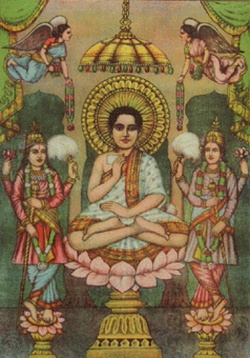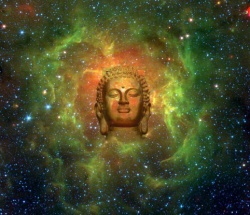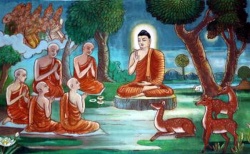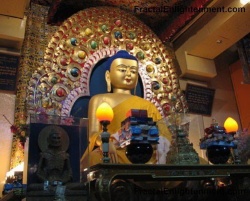Naraka (thing)
नरक, in Pali and Sanskrit - is often translated as "Hell", but it is an afterworld believed in in one way or another by various Hindus, Jains, and Buddhists. It is a place of expiation of sins, as opposed to an eternal punishment, although the penalties thereof are extensive and hinted at as being in the billions of years.
The similarities, in those religions, are that the souls of the departed are "triaged" by Lord Yama or some other similar underworld God, who penalizes the dead with various penalties based on the type and severity of the offenses caused. It is similar to a human justice system, in which punishment is meted out to redress sin - but at the end of it, the soul moves on to some kind of rebirth.
Examples of the punishments are particularly horrific - being deep fried in boiling oil, being eaten alive by insects but constantly regenerating, being disembowelled, speared, etc and interestingly are remarkably similar to medieval paintings of the Christian Hell, with dark spirits as literal Hell-Wardens tormenting the departed.
What makes Naraka an interesting concept in Buddhism is that the Buddhists generally (because Buddhism contains a variety of different sects, it's unfair to lump them all together) do not believe in a soul or the transmigration thereof to another body - rebirth to them is not the transmigration of a soul from one body to another - and because it does not recognize Gods as such, it makes the Devadutta Sutra all the more interesting.
In it, one of the lectures the Buddha gives according to the Pali Canon - the dead are brought before Lord Yama in Nararka, and asked about the Five Witnesses: these being a small infant, a wizened and aged person, someone severely diseased and afflicted, a criminal about to be tortured, and a days-old corpse. In each case Lord Yama asks if the sight of any of these compelled the person to consider his or her actions in the light of the misery of existence and act accordingly. In each case, he responds interestingly:
"My good man, through heedlessness you did not do what is good with body, speech, & mind. And of course, my good man, they will deal with you in accordance with your heedlessness. For that evil karma of yours was neither done by your mother, nor done by your father, nor done by your brother, nor done by your sister, nor done by your friends and companions, nor done by your kinsmen and relatives, nor done by the devas. That evil karma was done by you yourself, and you yourself will experience its result."
In other words, the penalties that follow, which are detailed, graphically - including leading the hellbound away with a red hot spike through both hands, both feet and the chest, being sawn apart by adzes, freezing in a cold hell where blisters form and pop, burning in a hot hell in which even the bones turn to smoke, an Excrement hell where the condemned is eaten repeatedly alive by needle-mouthed worms, and the dismembering "sword-leaf forest" - are a direct result of one's actions, and not the judgments of a God. It's not the wrath of an angered deity, but the cosmic equivalent of a series of parking tickets to fine the consciousness for its misdeeds, the fulfilment of a natural law of cause and effect.
Stories about Naraka and/or the planes of existence are contradictory, and its location, like Mount Olympus being the seat of the Gods, is literally impossible in light of science. And yet, the Buddha was emphatic about the fact that there being no soul or permanent consciousness, excepting that which may be punished - which doesn't really fit in to other statements made about there being no permanent consciousness or Gods. There's nothing peculiar about Buddhism in this regard - any religion that talks of any kind of Hell will eventually be asked about why such a horror would even exist and how this fits in with the concept of an all-loving, all-merciful God, and what the God expects us to do to avoid such a fate.
Different groups of Buddhists respond to this differently: some explain it's a metaphor, others explain that it's the consciousness creating its own nightmare reality in response to its own inputs, of life, of feeling. Some do believe in it as a literal plane of existence whose function is most certainly as written - and there are fundamentalists in Thailand who produce Hell-gardens to attract tourists and frighten the locals in the same way American fundamentalists create Hell Houses at Hallowe'en. Some explain that it provides a reason to live right for those unenlightened enough to understand cause and effect work on this plane and can affect the future for self and others, and when the Buddha spoke to his intimates, he used the carrot of Nirvana.
Some say that Naraka is proof positive that Jesus' lost years were in Asia: that he pulled some very un-Jewish ideas about afterlife flames and torment from the Indians, Nepalese or others in the region - with a pre-existing, well-documented, and vivid description of the due penalty, dispassionately enforced, to expiate karma.
But it is to be remembered that it isn't a place of judgment and penalty, but the reaction to the bad actions in life. That everyone is subject to it, but only as long as it takes to "burn" off one's karma. It is probably closer to the Catholic idea of Purgatory. And it most certainly is not eternal.



